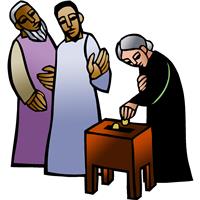There is one word I just learned about a couple of days ago, and I decided that this will be my motto for 2019: coddiwomple. And I kid you not, this word actually exists. Has anyone here ever coddiwompled? I have. And I have a hunch, you have too.
But what does ‘coddiwomple’ mean? ‘Coddiwomple’ is an English slang for ‘traveling purposefully toward an as-yet-unknown destination’. To coddiwomple is to travel purposefully toward an as-yet-unknown destination. We go with purpose into something that we don’t know about yet. It’s a great word, isn’t it?
And if you think about it: today’s gospel story is all about coddiwompling. It is the well-known story of the magi from the East following the star and finding the child Jesus.
Who were those mysterious magi? Tradition quickly determined that those magi must be kings – maybe based on the prophecy we heard about in today’s first lesson from the book of Isaiah, or the psalm that we prayed, both saying that kings would come and worship the Messiah. And who else would be able to bring such precious gifts – gold, frankincense, and myrrh – the latter two rare tree resins, used for perfumes and embalming of bodies.
And because there are three gifts, people concluded that there must have been three of those kings. But we don’t know. As for the number, we just know that there was more than just one star follower – maybe two, maybe three, maybe 15 or more. Maybe there were women among them. We don’t know.
The word ‘magi’ is also complicated. Originally magi are followers of the Zoroastrian cult of Persia, which goes back to at least the 5th century BCE. But in the writings of the Old Testament and the New Testament, ‘magi’ was used as a general derogative term for anyone from the pagan world who concerned themselves with magic – like sorcerers, or fortune tellers, or astrologers, dubious folks. In the boom of Acts, we read about how Paul and Barnabas encounter a magi, a magician, a false prophet, a charlatan, in Cyprus.
And, as we read in some historic writings, even Christians were called ‘magi’ by their opponents and accused of dark magic; their rituals were just too suspicious (like eating someone’s body and drinking someone’s blood).
It is interesting that, whereas ‘magi’ usually is translated as sorcerer or charlatan, in the case of our gospel story we either have the translation ‘wise men’, (‘Weise’ in German), or the word is just not translated – as if the search for Christ somehow elevates these pagan astronomers from the East.
But it is this group of charlatans, sorcerers, astrologers who read the signs in the stars: a king must have been born somewhere in the West. And so they set out to find this mysterious king and honor him. They coddiwomple – they travel purposefully toward an as-yet unknown destination. They are prepared – even though they don’t know for sure where their journey is going to lead them. And because they don’t know for sure where their journey is going to lead them, they are open to possibilities they may not even think of.
This is what this story emphasizes: it doesn’t matter where you are coming from, it doesn’t matter what others think about you, your past doesn’t matter – what matters is the openness to God’s signs and guidance – even though God may guide you in some quite unexpected ways. God is open to you, no matter who you are. God’s grace is offered to all. God’s son is born for all.
The magi coddiwomple as they follow the star. But even they are thrown off for a bit by their expectations. For where would a king be born? In a palace, of course, at a king’s court. And so they don’t follow the star trail at the end, but stop in Jerusalem, to inquire about this new born king at the court of Herod. And that leads to a whole new series of horrible events, and I don’t want to get into that right now.
But as they figure out that the new born king is not in the place they expected, once more they are open to guidance, this times through the scriptures and ancient prophecies. As the scribes point them toward Bethlehem, they continue their uncertain, yet purposeful journey – the star finally stops, and they find the child in Bethlehem, in a house, we hear, not in a stable.
They are overjoyed, we hear. They trust the signs, even though the child they find is not in the political center of the region, but an obscure small town; not in a palace, but a simple house; not surrounded by servants and nurses, but with his mother, a simple young woman. They trust the signs, even though this is a strange king, an unexpected king. Up to the point they find Jesus, they are open to possibilities they didn’t even think of.
But this is not where their journey ends. ‘And having been warned in a dream not to return to Herod’ – who, of course, in his thirst for power plans to kill this new king – ‘they left for their own country by another road’. In the original Greek, it actually says, ‘and they left for their own country by another way (‘hodos’ in Greek)’. Of course they want to avoid Herod, but there is another meaning hidden in here: the young Christian community called itself ‘the Way’. Those magi understand they cannot continue in their ways as usual after seeing this strange, humble king. Their lives, their ways are changed, even as they return to their own country.
And so their coddiwompling continues. With no star to guide them anymore, they set out on a new journey, traveling purposefully to an as-of-yet new unknown destination in life – and in faith.
Their story becomes our story. I think it is very fitting that we hear the Epiphany story just after we mark the beginning of a new year. Many ask themselves at the beginning of a new year what it will bring. There are those who have resolutions, those who want to better their lives or their health. There are those who go into a new year with trepidation or even fear of changes, fear of new ways. There are those who are rightfully concerned about where this country, where this world is going.
But in the end, what better way than to coddiwomple through this new year? To have purpose, and to be purposeful – to not give up on our values and our convictions – to be open to God’s guidance, which may lead to possibilities we might not even think of – to stubbornly love and hope and be gracious – to look for Christ in maybe unexpected places and unexpected people – as we go ways yet unexplored to destinations as-yet unknown.
Wherever we go – we can be confident that God is there. Fear not!
I would like to close with some lines by Austrian poet Rainer Maria Rilke. These are lines he wrote on New Year’s Day 1907 to his wife, Clara. And though Rilke may not have known the word ‘coddiwomple’, I think his words express, in more refined and, yes, poetic way, what coddiwompling is all about:
“And now let us believe in a long year that is given to us, new, untouched, full of things that have never been, full of work that has never been done, full of tasks, claims, and demands; and let us see that we learn to take it without letting fall too much of what it has to bestow upon those who demand of it necessary, serious, and great things.”
To which I can only say: Amen.






